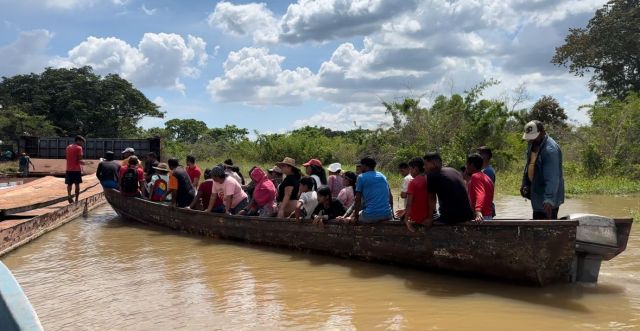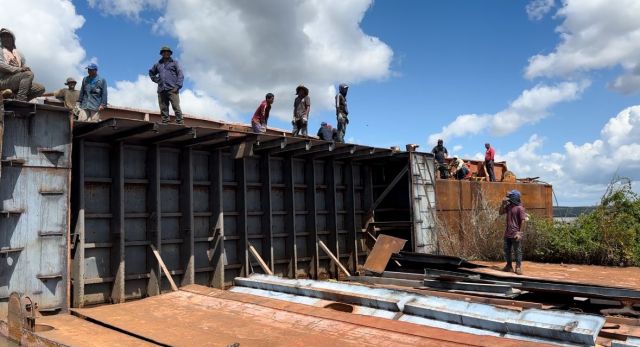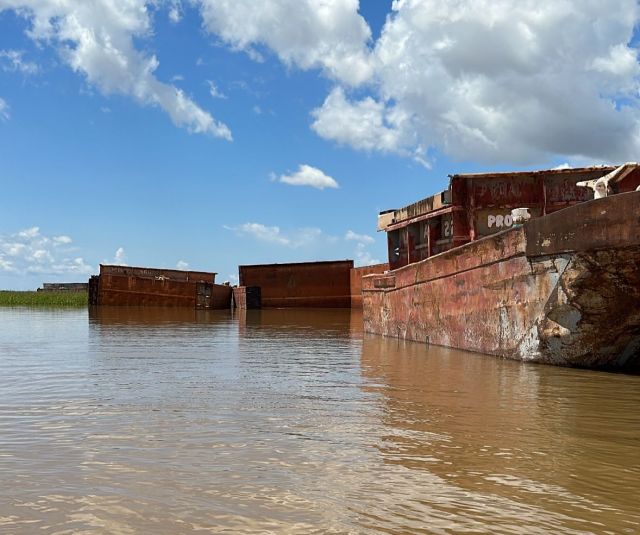
Under a bush there are a group of women. Some wear a long nightgown like a robe, called a sayal, a ribbon on the forehead and necklaces made by themselves, while others wear pants and a shirt. Men and children stay close, but the predominant voices are those of the women.
Pableysa Ostos // Correspondent lapatilla.com
We drove for more than 20 minutes, leaving Bolívar State behind. A distance of about 39 kilometers separates Ciudad Guayana from the indigenous community of Macapaima across the river, in Anzoátegui State.
The community is small, it has only five streets and about 315 people live there, counting Creoles and Kariña indigenous people. At first glance, everything seems to be fine, but after one enters the town, one begins to see the deficiencies suffered by some 110 families.
On Tuesdays and Saturdays a bus operates on the Macapaima-Ciudad Guayana route, the only opportunity they have to travel to the city and do their shopping. In the community there are no educational institutions, so boys and girls must go to Palital, a small village about 11.3 kilometers away, a journey that they cover on foot and can take more than an hour, due to the lack of public transport.
The same thing happens with healthcare: to attend to any ailment they must go to Palital or Ciudad Guayana healthcare centers. But that day they summoned us not only to denounce this problem, but also to recount a struggle that the natives have suffered for more than 20 years.
This “battle” that has gone through the hands of lawyers, the Public Ministry (MP), as well as courts, plus countless copies of documents that have been introduced into various government agencies. Yetzeli Martínez, Governor of the Kariña Macapaima Indigenous Association, explained that the ACBL company of Venezuela left some barges abandoned.
“For more than 20 years they have caused environmental damage to our community. Those people (ACBL company). Then they came to beach the barges there, they would break their trains, leave barges beached everywhere and then even stop paying attention to them.”
“The first thing we did was go to the company to ask them to remove the barges because they were polluting the river and occupying our planting areas, but what they did was insult us. Then we started the legal battle in the courts and the environmental prosecutor’s office, they helped us. We started a lawsuit against the company, which we won,” explained the 35-year-old woman and mother of 3 children.
These barges are flat-bottomed small draft boats, “mainly built for the transport of heavy goods along shallow rivers and canals. Barges are usually not self-propelled and need to be moved by a tugboat to pull or push them in “trains”. A typical barge measures 59.4 m x 10.7 m and can load up to 1,500 Tons (metric). The draft lines of the barges, as well as their tonnage, vary greatly from one port to another,” according to the Integrated Classification and Nomenclature Consultation System (SIN).
Obstacles and sabotage

The MP (Public Ministry, Attorney General’s Office) appointed the Ezequiel Zamora Ecosocialist Corporation (Corpoez) to carry out the environmental cleanup. This corporation carried out a bidding process to select a company which would be in charge of executing these environmental cleaning tasks.
The company in charge of this would be ‘Tridente Service’, as indicated by the inhabitants. The company has attempted to perform the assigned work. “We had been waiting for a long time, but through this process other problems have arisen, such as the fact that the ACBL Company continues to intervene, saying that there is no contamination and keeps involving other parties to prevent said sanitation from being carried out.”
They added that the intention of Tridente Service is to provide employment benefits to the community, since it would be the inhabitants of the indigenous community who would take part in the project to destroy and clean up the barges.
Presumably a few days ago, ACBL would have hired a tugboat when at the same time Tridente representatives were also carrying out the mooring operations. “When they were moving three barges, the ACBL tug tied itself to the first barge to take some away, they made a whole fuss. They intimidated everyone and prevented what had been ruled by the court from being carried out. A writ has already been entered into the court to request that they rule on the contempt of the measure (previous ruling),” denounced those affected.
“We are still fighting and we are going to continue here although we may cause conflicts as a result, right? But here is our town. This town really wants this to happen, and this is what we all want too, we want this to happen. Well, if you take a look here, you can see this family group and this generation that has been growing up. These are the children who are, as they say, our replacement citizens. So we look for a way to leave something to this coming generation,” said Martínez.
She made known that there are some 38 stranded and abandoned barges on the banks of the Orinoco River since 1998, according to what the lawyers handling the case were able to confirm through Google Maps.
Fatal pollution

The complaint was presented before the Third Prosecutor’s Office in Environmental Jurisdiction of Ciudad Bolívar, according to file FP.2-2023-5266, and that it was introduced due to an outbreak of scabies, diarrhea, among other illnesses that have occurred in the community.
For their part, they were able to determine with water chemistry tests carried out by representatives of the Universidad de Oriente (UDO), who corroborated that the water has a slight acidity and heavy minerals, low oxygen availability and suspended solids.
They also took samples of the sediments, in the report one can observe that these are acidic, with a fine granular texture with traces of heavy minerals and the absence of hydrocarbons. But the conclusions of these evaluations do not indicate the percentage of contamination levels of the samples studied.
This file has about 196 pages. The community has been inspected by the Public Ministry (MP), and they have even undergone forensic medical examinations. The environment commission of the Bolívar State Legislative Council also carried out its investigation and denounced the serious health problems suffered by this indigenous community. They recommended the same measures adopted by the court: clean up the river and remove the barges.
“Here we have sick people, who have had scabies, have suffered from stomach problems, there are so many things that have arisen as a result of this contamination, so they continue to think that this is not causing harm to the indigenous community. Because we are indigenous, they believe that we are worthless. We want ACBL to realize the damage it causes to our community,” stated Yetzeli Martínez.
They explain that these barges were used to transport bauxite, oil tar, and other materials. “When they did maintenance, the particles fell into the river. And there are still people who live on the banks of the river and many times we have had to drink from that water.”
Carmen Martínez, 75, commented: “Our children go there to fish, so they go to catch contaminated fish. We are going to drink that contaminated water, this cannot be, because we all get sick. I myself have had rashes. About the planting, I don’t know anything”.
In the community they have a deep well, but when the pump breaks “we have to go to the river, we have no choice but to wait for the rain to come and catch the water. That is the only way. The institutions are far away and waiting for them to move until the pumps are fixed, and one must go to the river to survive. There are indigenous people who live on the banks of the river and we must consume those waters.”
What does ACBL do?
ACBL describes itself on its website as “a freight transport service company through inland waterways by barge. Our guidelines are framed in the culture of quality, guiding the way of life and work based on productivity and excellence, allowing a harmonious balance to be achieved within the organization.”
“Founded in 1993, with headquarters in Ciudad Guayana, Venezuela, the country’s main industrial city. It is the largest fluvial and lake transport company using barges that operates on the Orinoco River and its navigable tributaries,” they detail.
Among the services they offer are river transportation, ship maintenance, terminal/port operations, and special projects.
Its offices are located on Avenida Guayana, Los Samanes neighborhood, Torre Corporativa Bell, in Alta Vista. They also have a contact number on the page. The reporting team from lapatilla.com tried to reach with them in order to find out their position on this case, but the person who answered by telephone pointed out that “the board of directors is in Caracas and comes to the city sporadically and we are not authorized to give any information.”
Requesting solutions

The governor of the indigenous community emphasized that they want their rights to be respected. According to Martínez, ACBL representatives have told her that they are “sponsored by people who have power. They have mentioned that the governor of Anzoátegui State supports them, that even the Governor of Bolívar State backs them,” added the indigenous leader.
She also highlighted: “What we demand here is our right to be respected, to really have this sanitation done in our community so that we too can obtain a benefit and live in peace in our community. That’s what we’re looking for.”
The reporting team from lapatilla.com traveled through Cambalache, in Puerto Ordaz (Bolívar State), by boat to the area where some of the barges are located, verifying their presence, the poor state in which they are found (heavily rusted) and others that already sank in the Orinoco River.
Case timeline
March 13, 2023: the community requested environmental measures to be heard before the 5th control court. Measures were agreed to stop pollution and destroy the barges and clean up the area. The national assistant internal prosecutor 68 with full jurisdiction of the MP in charge of the 3rd prosecutor’s office of the MP with jurisdiction over the environment and environmental crimes heard about the case of Freide Karina Morillo Miranda.
March 14, 2023: The case entered the court. A precautionary ruling of environmental nature was issued. There are 37 numbered barges and one without numbering, for a total of 38 barges.
March 16, 2023: A decree on the precautionary measures indicating that they accept the measure and order the execution of works to avoid further damage in the community. ACBL was notified of the measure to destroy and neutralize the agents that harm the community, as well as the order to clean up, remove or retain abandoned vehicles or objects.
July 3, 2023: works begin by Tridente Service. This day they were only able to tow away three barges since ACBL representatives prevented them from continuing to carry out the maneuvers, according to what was denounced by those affected.

